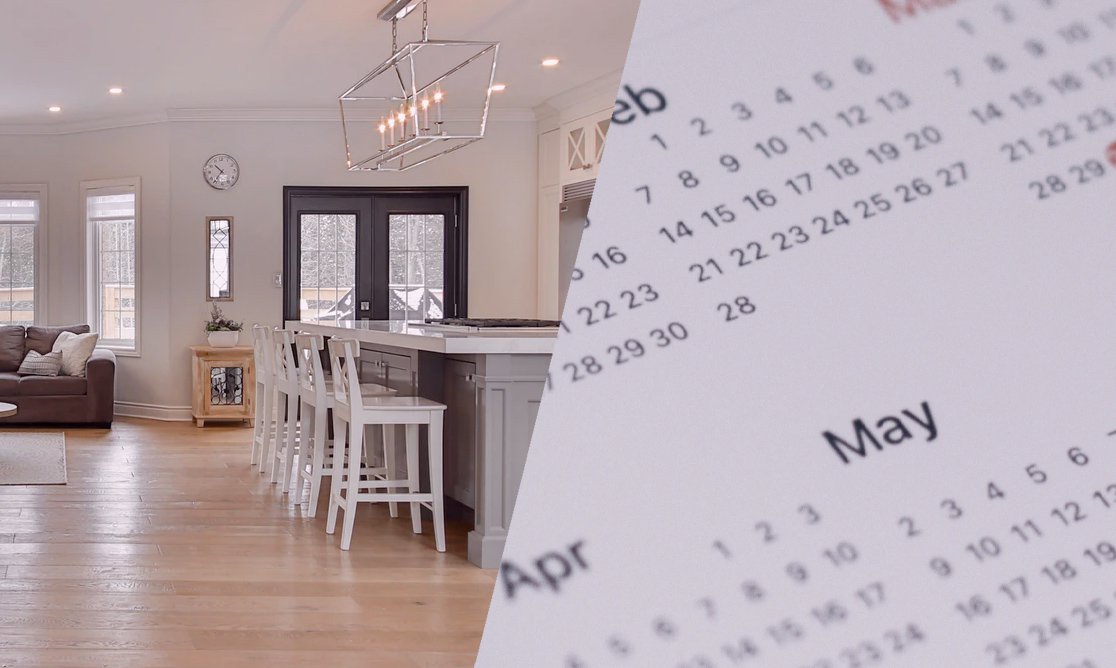- Found your dream house and need to move fast?
- We examine the home loan application process in detail, and work out how long it takes for each stage of the application process.
- Speed up your home loan approval time by following our tips.
Buying a home can be a stressful experience, especially if you’re a first-time buyer. And one of the most anxiety-inducing parts of the whole process is getting your home loan approved, especially not knowing how long it might take.
So, with the aim of trying to minimise that aspect of home-buying tension, let’s explore how long it actually takes to get a home loan approved.

Ready to buy or refi?
Talk to a mortgage broker
- Get professional help to secure finance.
- Book a call online for a convenient time.
- Find a mortgage broker near you.

In this guide

Unloan Variable Home Loan (Owner)
Interest rate (p.a.)
5.99%
Comp rate^ (p.a.)
5.90%
Max LVR
80.00%
Application fee
$0.00
Monthly repayment
$2,695.08
Total repayment
$970,228.80
Highlights
- Get a rate discount every year.
- No application fees, no account fees, and no exit fees.
- Borrow up to 80% of your home’s value.
- Refinancing only.
Average home loan approval time
The amount of time required for home loan approval will depend to some extent on the type of property you intend to buy and therefore the type of loan you need.
- Loan for existing house or apartment, to be owner-occupied. A typical house, unit or apartment requiring a standard loan is one of the quickest approval types, assuming that you have covered all other factors (satisfactory income and financials, acceptable credit score, adequate deposit, no omissions in documentation provided by applicant). Depending on the lender, you may be able to get conditional approval within 60 minutes, and final (unconditional) approval within 3 - 7 business days.
- Construction loan. A construction loan, for a home not yet built, is more complex. In addition to the normal documentation to prove your income and creditworthiness, you will need to provide the lender with building plans approved by the local council, a fixed-price contract from your builder, and evidence of builder’s insurance. Processing this paperwork will add at the very least a few days to the loan approval process.
- Investment property loan. A loan for an investment property usually has more demanding conditions, which may add to the time required for approval. You’ll probably need a higher credit score than for an owner-occupied loan, as well as a higher deposit than the usual minimum of 20% of the property’s value. However, if you have all these bases covered, an investment loan approval may take no longer than a traditional loan approval.
- Loan with less than 20% deposit. If your deposit is going to be less than 20% of the property’s value, you’re going to need Lenders Mortgage Insurance, or a loan guarantor. Getting either of these can be a time-consuming process, adding several business days, at the very least, to loan approval time.
- High loan amount. If you need to borrow more than $2M you’re obviously a high-earning individual, but given the higher risk the lender will want to be extra certain about your creditworthiness, the repayment affordability and the property valuation. You should probably factor in an extra five business days on top of normal approval time.
- Loan for unusual property type or location. Thinking of buying a heritage-listed house, a rural property, industrial or commercial premises you want to convert into a home, a tiny home, or a home located in a flood zone? Be prepared to be patient, because the lender will make extra enquiries and ask for additional documentation that will inevitably add to loan approval time.
- Loan application if you’re self-employed. You’ll have to jump through a few extra hoops to prove your income if you're self-employed, whether your structure is a company or sole trader. Expect to provide at least two years of company or personal tax assessments (and probably the detailed returns), as well as profit and loss statements, in addition to the normal documentation required for a standard loan. This means extra time spent preparing paperwork for you, and extra processing time for the lender. It could add a week to the approval time.
- Loan application by a non-resident. Foreign citizens living in Australia on a visa can still apply for a home loan, but it’s an unusual situation that’s going to take some extra time to work through. The timeline can be shortened by consulting a mortgage broker with access to lenders who specialise in this type of loan.
Loan approval timeline
A better grasp of the home loan approval process and the time required can be gained by understanding the stages to be worked through:
- Pre-approval. Whether you call it pre-approval, conditional approval or approval-in-principle, this is the stage where you make an enquiry to a lender to find out how much you can borrow, based on your financial situation. You may complete an online form, or be interviewed by phone, video or face-to-face. If you have all your information ready, In many cases you’ll get an indication of your borrowing power within 60 minutes. Pre-approvals usually last for three months, or up to six months with some lenders.
- Application. Once you’ve found a property you want to buy, you must go through a formal application process. This involves providing documentation to support the information previously given at pre-approval stage, including recent payslips (or tax returns and financial statements for the self-employed), bank statements, existing loan account and credit card statements, rental expense statements, and any other supporting documents the lender may ask for. If you have prepared all your paperwork in advance, it should take the lender no more than 3 - 7 business days to assess it.
- Valuation. Before a loan on a specific property can be approved, the lender needs to know how much it is actually worth, which may be a different sum from the amount you are prepared to pay for it. Appointing a professional valuer, having the valuation done, receiving the report and then assessing it can occupy the lender for 3-5 business days. But If this procedure runs in parallel with assessment of your financials, it won’t add to the total processing time.
- Paying LMI. Once the valuation has been received, the lender will have a clearer picture of your loan-to-valuation ratio (LVR). If the loan you need adds up to more than 80% of the property’s value, you’re going to need Lenders Mortgage Insurance (LMI) or a loan guarantor. LMI can take 1 - 2 days to arrange. A loan guarantor will need to seek legal advice and provide guarantor documents, which could add several days’ delay.
- Approval. If all your financial information – including your credit score – checks out, the valuation is satisfactory and any LMI or guarantor documents have been completed, you should receive a letter confirming that you loan has been unconditionally approved. Adding up the minimum and maximum processing times above leads to the conclusion that final loan approval will be reached in a minimum of three business days, sometimes less, and a likely maximum of around 15 days. Your lender will now issue a home loan contract, which you need to read, sign and return.
- Settlement. This usually takes place 4 - 6 weeks after sale contracts have been exchanged, so it could be as little as a week after final loan approval, or as long as five weeks.
How to speed up your home loan application
There are a number of things you can do to try to get your loan approved in the shortest possible time:
- Save as much towards a deposit as you possibly can. A good savings history makes you look like less of a risk for banks and will oil the wheels of your application. Also, if you can avoid LMI or a loan guarantor by having a deposit of at least 20%, you’ll move towards final approval more quickly.
- Get your documentation right, first time. Provide everything asked for in the loan application form, and make sure you are giving the most recent information. If the lender needs to ask for missing information, or needs something clarified, it’s obviously going to slow things down.
- Assist in the valuation process. Facilitate contact between the valuer and the vendor or real estate agent, so that prompt access to the property is possible.
- Read the contract carefully and get advice. Don’t just sign the mortgage document. Read it to make sure that every detail is what you expected, and consult your conveyancer or solicitor if there’s something you don’t understand. Once everything is in order, return the signed documentation to the lender as quickly as possible.

Ready to buy or refi?
Talk to a mortgage broker
- Get professional help to secure finance.
- Book a call online for a convenient time.
- Find a mortgage broker near you.

Unloan Variable Home Loan (Investor)
Interest rate (p.a.)
6.29%
Comp rate^ (p.a.)
6.20%
Max LVR
80.00%
Application fee
$0.00
Monthly repayment
$2,782.44
Total repayment
$1,001,678.40
Highlights
- Get a rate discount every year.
- No application fees, no account fees, and no exit fees.
- Borrow up to 80% of your home’s value.
- Refinancing only.
FAQs
Do all banks use the same home loan application process?
Essentially, yes. Larger banks may have a more automated process, simply because they are receiving more applications and are issuing more loans. But the required documentation and the steps in the assessment will not vary a great deal, because all lenders want to minimise their risk and are also covered by the same legislation when it comes to making sure that you can afford to repay the loan.
Do the Big Four banks approve home loans faster?
Possibly. An article in the Australian Financial Review noted that the Big Four had streamlined their processes following criticism of delays made by the Banking Royal Commission. ANZ, CommBank, NAB and Westpac now say that they can approve a ‘vanilla’ home loan in as little as one day.
Are there any banks that are notoriously slow at approving home loans?
There is no data to suggest that any one bank is especially slow, although smaller lenders in particular have seen their systems struggle with COVID-19 disruptions and lockdowns, coupled with an increase in housing market activity.
Do certain banks prefer working with certain types of home loan applicants?
Large banks have a very diverse client base and welcome almost every kind of home loan application. However, some smaller lenders do specialise in home loans for low credit scores, low deposits, new migrants or inability to provide standard documentation (e.g. the self-employed). Other lenders actively seek loan applications from professionals like doctors, teachers, lawyers or dentists. A mortgage broker may be able to help you secure a specialist home loan.

